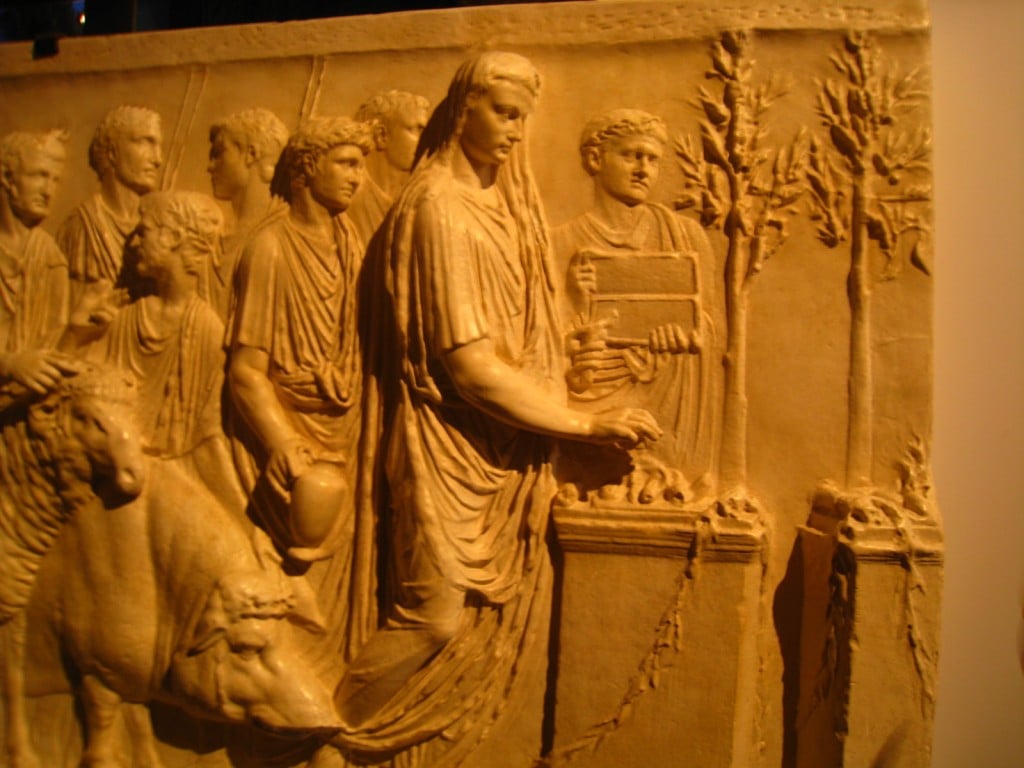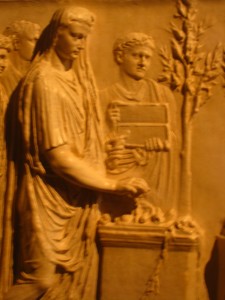“And when you are praying, do not use meaningless repetition as the Gentiles do, for they suppose that they will be heard for their many words.” — Matthew 6:7

As Jesus teaches on prayer in Matthew 6, he transitions from the example of “the hypocrites in the synagogues” (Matt 6:2, 5) to “the Gentiles” (Matt 6:7). Commentators generally understand Jesus’ condemnation of “using meaningless repetition” (βατταλογήσητε) and “many words” (τῇ πολυλογίᾳ) as either (1) formulaic and legalistic repetition of intelligible prayers; or (2) pagan magical incantations (probably unintelligible gibberish). I lean heavily toward the first view, not least because of the prevalence of repetitious intelligible prayers carried out in the Roman culture (both private and public).
‘Repetition’ and ‘Many Words’ in Prayer
With respect to the first view, Nolland (NIGTC) refers to the repetition of “names of Gods, petitionary formulas, etc.” (284). This is an accurate (though unfortunately brief) description of what is typical in Roman prayers. Classicist Jo-Anne Shelton has a nice treatment of the subject in her sourcebook, As the romans Did (363-380). She notes that Roman prayers typically included “an address to the deity, a catalogue of his or her ancestry and powers, the reminders of a previous good relationship and an appeal for assistance” (366). To illustrate how formulaic Roman prayers were, she includes a bit from Pliny the Elder, Natural History 28.2(3).10,11, worth quoting in full:
It apparently does no good to offer a sacrifice or to consult the gods with due ceremony unless you also speak words of prayer. In addition, some words are appropriate for seeking favorable omens, others for warding off evil, and still others for securing help. We notice, for example, that our highest magistrates make appeals to the gods with specific and set prayers. And in order that no word be omitted an spoken out of turn, one attendant reads the prayer from a book, another is assigned to check it closely, a third is appointed to enforce silence. In addition, a flutist plays to block out any extraneous sounds. There are recorded remarkable cases where either ill-omened noises have interrupted and ruined the ritual or an error has been made in the strict wording of the prayer (372).
An Ancient Roman Example
The Suovetaurilia was a sacrifice ritual named after the three animals which were required for the event: a  pig, sheep, and bull. In the pictures (above and right), you’ll notice one person preparing the altar with a head covering (perhaps about to pray). To his right stands one reading a formulaic prayer, likely to be repeated line by line by the one with his head covered. It seems that in the Roman view, strict adherence to a formula would obligate the god or goddess to respond in kind.
pig, sheep, and bull. In the pictures (above and right), you’ll notice one person preparing the altar with a head covering (perhaps about to pray). To his right stands one reading a formulaic prayer, likely to be repeated line by line by the one with his head covered. It seems that in the Roman view, strict adherence to a formula would obligate the god or goddess to respond in kind.
Jesus’ Model
In stark contrast to this, Jesus advises that prayer be done in secret (emphasizing sincerity, not condemning pubic corporate prayer altogether) and in humility. One should not think to obligate God by some formula. Rather, one ought to pray to God as a dependent child makes request to a Father (Matt 6:9-13). In my view, Jesus gives a model for prayer (rather than a strict formula!), but in any case, he clearly commands that prayer be done with sincerity and humility, recognizing one’s needs and the ability of the Father to provide for such needs. Prayer is no doubt petition at its core, but in Matthew 6, Jesus challenges the crowds regarding the attitudes and motives underlying prayer.
Update: Mike points out an important question: How Roman was first century Palestine? Feel free to jump in below!
excellent post; i do wonder, though, how prevalent typical “roman” prayer was in palestine. in other words, did Jesus really have something more roman in mind than something more jewish (and thus more relevant) to his audience. but i guess, by qualifying his teaching with “as the gentiles,” you’re probably spot on.
tag! i’m recruiting you to share your thoughts – http://foxswanderings.blogspot.com/2009/10/my-problem-with-review-of-biblical.html
Mike, I think you raise an important question. I meant to address this in the original post, but I obviously left it out. By no means am I interested in over-Romanizing NT events in Palestine! I think you’re right to point out the importance of the phrase “as the Gentiles.” But just how ‘Roman’ was first century Palestine?
A while back I read an interesting article in JBL by Byron McCane entitled “Simply Irresistible: Augustus, Herod, and the Empire” (127:4, Winter 2008). He contends that Herod the Great was something of an aficionado of all things Roman. He notes the architectural achievements of Herod as reflecting an Augustan building strategy with some thoroughly Roman features (giving the temple as one example!). If Herod the Great ruled from around 40-4 BCE, then I wonder how much of Roman culture he might have imported by the turn of the century. Certainly there was also a Roman military presence in addition to the Roman appointed leadership. Ultimately, I’m still a bit unsure what the cultural mix looked like.
whoops, i mixed up the e-mail and name again lolz
[…] Read the whole post here. […]
josh,
great point about herod. there’s a recent book called “herod the great builder” or something like that which details his building projects. having stood in the herodium in bethlehem and looked at the roman bathhouses at masada, i think it’s safe to say herod heavily romanized the land. caesarea maritima is another telling example. the most pertinent examples, though, are the herodian temples to augustus (another one was recently discovered near, i think, galilee). those structures imply that herod was interested in bringing roman religious culture (not just aesthetic culture) to palestine.
good thoughts
I think part of the answer to this is in your original post Josh. In a few places like Matt 5:47; 6:7; 6:32 and 20:24 Jesus contrasts what he’s saying with the practice of the Gentiles. If we take this as historically reliable (and I see no reason to doubt yet), then Jesus had a familiarity with Gentile (pagan?) piety and customs. If you were a Gentile in Palestine, what kind of allegiance and/or religious convictions would you have, if not somehow connected to Rome?
More on this is found in M. Chancey: Greco-Roman Culture and the Galilee of Jesus [Cambridge, 2005]. While I concur that we should not over Romanise Palestine, I’m confident that we can admit to Jesus being aware of their culture, because Rome had a presence in the Israel of Jesus’ day.
Thoughts?
Sean, I think you’re right that we can say Jesus was in fact acquainted with Gentile practices, including specifically Roman practices (i.e., a soldier pressing a civilian into service in Matt 5:41; Roman taxation in Matt 22:15ff; interaction with a centurion Luke 7, etc.). What I’m less sure about relates to your second question: To whom might Jesus be referring by the phrase ‘Gentiles’? Is this a very generic reference in this instance, which lumps many different Gentile prayer practices in one category or is the reference more specific? I think either one is possible.
I suppose the ambiguity in part explains my subtitle: “Two Ancient Views.” I cannot be absolutely sure that Jesus is referring specifically to Roman prayer practices (which could include public rituals as pictured above or private prayer), but I can be sure that Jesus’ model for prayer is very different from examples we find in Roman prayers. I think the contrast is worth noting. Fortunately, not knowing the exact referent of the word “Gentiles” does not significantly affect the meaning of Jesus’ teaching.
Josh, I’m not very familiar with the culture of that day, but was there really anyone at that time, Jew or Gentile, that believed in a deeply personal God? Before Christ came, wasn’t everyone’s view of God rather distant? If so, then it’s likely that Jesus’ words applied to all Gentile prayers, since there really wouldn’t be any prayers made by them that would be sincere and humble. Who would want to pray with sincerity and humility to a god whom they didn’t fully expect to answer them anyway?
I’m less inclined to think that there were many Gentiles who viewed their gods as ‘deeply personal’ in the modern sense, but there are good examples of the sincere devotion of certain Jews (even prior to Jesus). Take, for instance, Zacharias, Elizabeth, and Mary in Luke 1-2. Zacharias and Elizabeth are called ‘righteous’ (1:6), and Zacharias is found faithfully performing his priestly service ‘before God’, also making petition for his wife to conceive. God answered his prayer in quite a remarkable way.
In regard to your final point, I think that even the Gentiles generally expected their prayers to be heard, but not necessarily because of a ‘personal’ relationship. In the case of the Romans (as discussed above), they felt that a prayer would be answered if it was done with great care and without mistakes. I don’t think that the Gentiles in particular thought in terms of ‘relationship’ and a ‘personal walk’ with the gods or goddesses to whom they prayed, sacrificed, etc.
Ran across your post and it was very enlightening. Hope you are still writing.
Thanks. My writing is less frequent right now, but I expect it to pick up over the next few months. We’ll see!